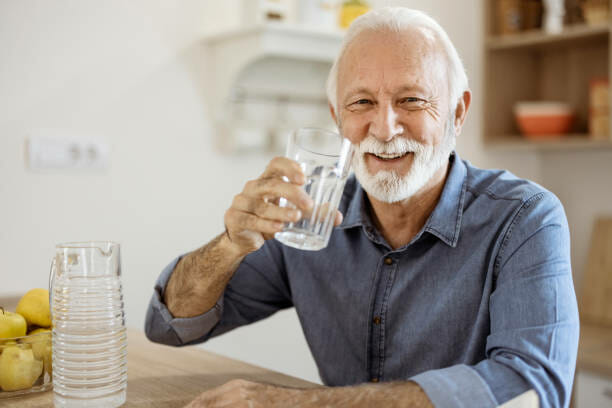
June 23 is National Hydration Day. However, you need to stay hydrated each day of the year – especially if you are an older adult. That’s because water consumption is not just a thirst-quencher. It’s essential to almost all your bodily functions, from pumping blood to your heart to lubricating your joints. Given that older adults are more likely to become dehydrated for many reasons – such as a diminished sense of thirst – it is important to increase your water intake to stay healthy and avoid complications associated with dehydration.
The Dangers of Dehydration
The advice of drinking eight glasses of water a day isn’t just a suggestion – it’s a necessity. Dehydration – when you don’t consume enough fluids– is a potentially serious condition that can lead to life-threatening complications, such as heat stroke, heart problems, kidney failure, urinary tract infections (UTIs), and blood clots. Also, dehydration affects your cells and can lower your body’s ability to fight off infections or heal from an illness or injury.
According to a study conducted by the Los Angeles School of Nursing, as many as 40 percent of elderly people are chronically underhydrated. How can you tell if you are one of them? One way is to inspect the color of your urine. If it’s dark-colored with amber or brown tones, you are likely dehydrated. If it’s clear or pale in color, you are probably well-hydrated.
Why are seniors more prone to be dehydrated? The reasons include:
- Diminished appetite and thirst.
- Less water in their bodies due to changes in body composition over time.
- Medications that increase their dehydration risk.
- Increased dehydration through sweating during exercise or activity.
Signs and Symptoms of Dehydration
Early symptoms of dehydration include:
- Dark-colored urine
- Urinating less frequently
- Fatigue or weakness
- Irritability
- Dizziness
- Headaches
- Muscle cramps in the arms or legs
- Dry mouth
- Confusion and decreased cognitive function
Aside from its health risks, one of the dangers of dehydration for seniors is that it can produce grogginess and a lack of coordination that can lead to falls and injury. A simple yet effective way to prevent dehydration is to drink more water throughout the day. A rule of thumb is to take one-third of your body weight and drink the corresponding number of ounces of fluids. Example: If you’re a woman weighing 120 pounds, drink 40 ounces of water per day. If you are a man weighing 180 pounds, drink 60 ounces of water per day.
Better yet, talk with your doctor about how much water you should drink daily. They’ll review your medical history and the medications you’re taking to determine the right amount.
Other ways to stay hydrated include:
- Choosing foods with high water content, such as certain fruits and vegetables (e.g., watermelon, cucumbers, celery, lettuce, strawberries, and tomatoes), soups, broths, and stews.
- Avoiding or reducing your alcohol intake. Because alcohol is a diuretic, it induces the removal of fluids from your bloodstream.
- Getting into the habit of drinking a glass of water when you wake up in the morning, after every meal, and before and after exercising or being active.
- Carrying a refillable water bottle wherever you go. This will make it easier to meet your daily requirement for fluids.
Although plain water is the surest way to stay hydrated, you may find the routine dull. If so, freshen things up with slices of lemon, lime, apple, or berries in the water. Other options, such as low-sugar sports drinks or protein shakes, are good alternatives, as well. Limit your intake of coffee and tea, as they can have a dehydrating effect.
Superior Senior Primary Care in South and Central Florida
At Palm Medical Centers, we not only provide comprehensive primary health care for our senior patients – including guidance on how to stay healthy – but also assist them in accessing and obtaining the social services, including Medicare application and plan selections, that are available to them and their families.
We have multiple locations within three miles of your home and currently provide service to more than 50,000 patients with a satisfaction rating of over 98%. Our specialized senior care includes:
- Doctors that listen to you
- In-house labs
- Medicare same-day appointments, walk-ins, and minimal to no-wait times
- Specialist care coordination
- Transportation assistance
- 24/7 access to the urgency line and care team
To book an appointment at the Palm Medical Centers’ location nearest to you, call (833)500-PALM (7256) or send us a message now.

 4.8 Google Rating out of 7K Reviews
4.8 Google Rating out of 7K Reviews






